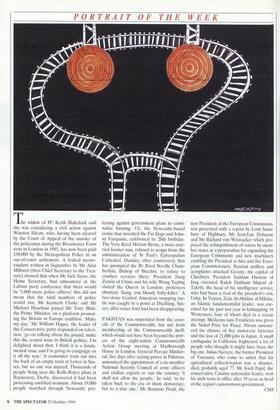PORTRAIT OF THE WEEK
The widow of PC Keith Blakelock said she was considering a civil action against Winston Silcott, who, having been cleared by the Court of Appeal of the murder of the policeman during the Broadwater Farm riots in London in 1985, has now been paid £50,000 by the Metropolitan Police in an out-of-court settlement. A leaked memo- randum written in September by Mr Alan Milburn (then Chief Secretary to the Trea- sury) showed that when Mr Jack Straw, the Home Secretary, had announced at the Labour party conference that there would be '5,000 more police officers' this did not mean that the total numbers of police would rise. Mr Kenneth Clarke and Mr Michael Heseltine joined Mr Tony Blair, the Prime Minister, on a platform promot- ing the Britain in Europe coalition. 'Make my day,' Mr William Hague, the leader of the Conservative party responded on televi- sion, `go on talking about the pound, make this the central issue in British politics. I'm delighted about that, I think it is a funda- mental issue and I'm going to campaign on it all the way.' A commuter train ran into the back of an empty train at Lewes in Sus- sex, but no one was injured. Thousands of people living near the Rolls-Royce plant at Raynesway, Derby, discovered it had been processing enriched uranium. About 19,000 people marched through Newcastle pro-
testing against government plans to crimi- nalise hunting. Viz, the Newcastle-based comic that invented the Fat Slags and John- ny Fartpants, celebrated its 20th birthday. The Very Revd Miriam Byrne, a twice-mar- ried former nun, refused to resign from the administration of St Paul's Episcopalian Cathedral, Dundee, after controversy that has prompted the Rt Revd Neville Cham- berlain, Bishop of Brechin, to refuse to conduct services there. President Jiang Zemin of China and his wife Wang Yeping visited the Queen in London; protesters shouted: 'Jiang, you bloody baby-killer.' A two-stone Central American snapping tur- tle was caught in a pond at Ditchling, Sus- sex, after water fowl had been disappearing.
PAKISTAN was suspended from the coun- cils of the Commonwealth, but not from membership of the Commonwealth itself, which would not have been beyond the pow- ers of the eight-nation Commonwealth Action Group meeting at Marlborough House in London. General Pervaiz Mushar- raf, five days after seizing power in Pakistan, announced the appointment of a six-member National Security Council of army officers and civilian experts to run the country; 'I shall not allow the people,' he said, 'to be taken back to the era of sham democracy, but to a true one.' Mr Romano Prodi, the new President of the European Commission, was presented with a report by Lord Sains- bury of Highbury, Mr Jean-Luc Dehaene and Mr Richard von Weizsacker which pro- posed the relinquishment of vetoes by mem- ber states as a preparation for expanding the European Community and new machinery enabling the President to hire and fire Euro- pean Commissioners. Russian artillery and aeroplanes attacked Grozny, the capital of Chechnya. President Saddam Hussein of Iraq executed Rafeh Dahham Majoul al- Takriti, the head of his intelligence service, who had been a rival of the president's son, Uday. In Yemen, Zein Al-Abidine al-Mihdar, an Islamic fundamentalist leader, was exe- cuted for his part last year in kidnapping 16 Westerners, four of whom died in a rescue attempt. Medecins sans Frontieres was given the Nobel Prize for Peace. Nissan announ- ced the closure of five motor-car factories and the loss of 21,000 jobs in Japan. A small earthquake in California frightened a lot of people who thought it might have been the big one. Julius Nyerere, the former President of Tanzania, who came to admit that his agricultural collectivisation was a disaster, died, probably aged 77. Mr Jordi Pujol, the conservative Catalan nationalist leader, won his sixth term in office after 19 years as head of the region's autonomous government.
CSH


















































































 Previous page
Previous page